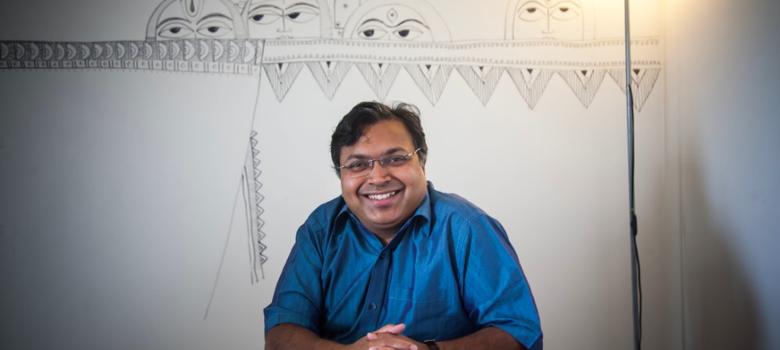This was an eventuality after writing 7 secrets of Shiva and 7 secrets of Vishnu which, incidentally, were published simultaneously. Also, I saw many people writing on the goddess mythology and I felt it was time to add new data to the on-going discourse of feminism that often had a rather warped view of Indian mythology based on incomplete, and often prejudiced, data
7 Secrets of the Goddess is very different from the other books in the sense that it explores femininity and masculinity very uniquely. Was this intended? What led you to explore such themes?
Whether we like it or not, our understanding of femininity and masculinity has two roots. One is the conventional "home" and "street" discourse, which we identify as traditional. Then there is the overpowering Western discourse that shapes our education system and the virtual world of the Internet. Typically, one finds these two discourses at loggerheads, with Western views projecting themselves as saviors and harbingers of gender equality, and traditional views projecting themselves also as saviours, but of culture, protecting the world from Hippie revolutionaries. My study of world and Indian mythology revealed that a great deal about our culture is not known to people, especially when it came to goddesses. They have a lot of assumptions about Indian thought, but very little data. I felt I needed to show them what I had seen. Hence, this book.
Were you always drawn to the imagery of goddesses? Has that always interested you?
Honestly, I never separate goddesses from gods. In Hinduism, Shiva cannot exist without Shakti and Vishnu cannot exist without Lakshmi. For me, goddesses completes the jigsaw puzzle of which Shiva and Vishnu and Brahma are integral pieces. They are all parts of the whole. To see goddesses isolated from gods (favoured by many Western feminists) is no different from seeing the gods as independent of goddesses (favoured by Abrahamic religions like Judaism, Christianity and Islam). Both are exclusionary, a tendency popular in contemporary modern discourse. Neither is inclusive, a tendency favoured by traditional Indian discourse, but something we are increasingly choosing to forgo.
How relevant are the secrets of Goddess in today's age and time? Does mythology ever become outdated?
These secrets are timeless. Those who see mythology as outdated either equate mythology with history, bound to some distant time period, or assume that people today are dramatically different from those who existed a thousand years ago. Yes, for sure, our technology is different. We have cars and cellphones. But psychologically we are still the same as our ancestors. We still cannot handle ambiguity and insecurity. We still yearn for control. And we still suffer heartbreak. Stories, symbols and rituals of Goddess enable us to deal with fears of lives, fears that are timeless.
Why did you choose to include Gaia in this collection?
Hindu mythology is part of Indian mythology. Indian mythology is part of World mythology. I wanted to show how the mythology of Goddess in India has many things in common with the mythology of the goddess in other parts of the world, but I also wanted to show how many things are distinctly unique.
There is a tendency amongst many mythologists to paint all cultures with the same brush – since Greek gods overshadowed Greek goddesses, since the Abrahamic God rejected the feminine completely, it must be true in Hinduism too. But that is not the case. The goddess has a complex relationship with gods in Hindu mythology, sometimes at his feet (like Lakshmi at Vishnu’s) and sometimes dancing on his chest (like Kali on Shiva’s) and sometimes fused into his body (Ardhanarishwara, for example).
What goes on in the mind of the writer when he sees the hypocrisy, where on the one hand we worship women and on the other, we are also quite brutal to them? How transferable is the power of the goddess to the common woman?
Is the gap between our understanding of Hindu mythology and our understanding of Hindu social reality indicative of Indian hypocrisy? Or is it an indicator of our poor understanding of Hindu mythology and Indian social reality? Guess the preferred ‘global’ answer: Indians are hypocrites. The intelligence of the Western rational, secular, scientific intellectual cannot be questioned.
Reputed Universities around the world equate mythology with propaganda. This makes sense when we study Western mythology and Western social reality. The patriarchy of pre-Christian Europe can be attributed to Greek myths where Zeus sidelines Gaia and rapes nymphs. And patriarchy in Christian Europe and America can be attributed to Abraham’s God who has no wife, or daughter.
We can easily argue that Europe and America treat women as equal to men because they have become enlightened enough to challenge and reject Greek and Biblical mythology, while West Asia is unable to do so as it still under the influence of Biblical (or rather Koranic) propaganda.
Surely the same must be true of India. So we reframe Hindu mythology along Greek and Biblical lines. But wait a minute! It is not so easy. Yes, we can argue that India is patriarchal because of the Ramayana, so loved by the Hindu fundamentalists, where Ram brutally abandons the pregnant Sita.
But what about Kali? Surely Kali holding the severed heads of men, and only men, in her hand, and garlanding herself with a string of male heads, must also be ‘teaching’ angry victimised women how to kill villainous men.
And Gauri, and Radha and Draupadi? Do they teach women to be domesticated or demanding? Have you read the stories? Could it be that the complexity and ambiguity of Hindu mythology also reflects the complexity and ambiguity of Indian society, a complexity and ambiguity that the exasperated Western mind calls chaos?
My book raises these questions. It questions assumptions about Goddess, and about God.
Vivek Tejuja works at Flipkart and loves to recommend books










